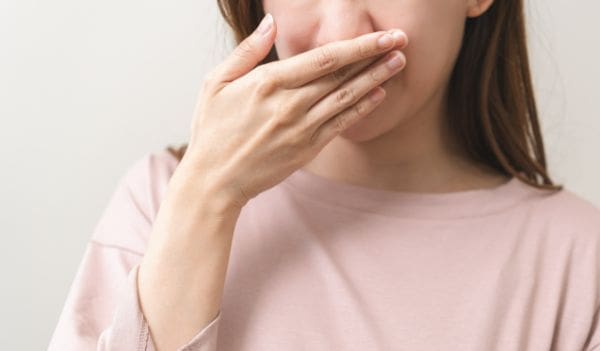
Have you ever found yourself in a situation where an unpleasant breath odour causes discomfort or embarrassment? If yes, you might be dealing with a common but often overlooked oral health issue—Halitosis.
The good news? It doesn’t have to be a lasting difficulty. Understanding the right practices can make managing halitosis simpler than you imagine. As a leading emergency dentist in Manchester, we sympathise with the pain associated with this condition. Today we will guide you through preventative measures you can take along with what to expect if you suffer from the issue.
What Is Halitosis?
Halitosis, also known as bad breath, is an oral condition characterised by persistent, unpleasant breath odour. While most people experience bad breath occasionally, halitosis is a more chronic condition that can negatively affect one’s quality of life. It’s important to remember that bad breath is incredibly common, and there’s no need to feel ashamed if you’re dealing with it. Around 1 in 4 adults in the UK are estimated to suffer from bad breath at varying frequencies.

Numerous factors, including poor oral hygiene, dry mouth, certain foods, and some medical conditions, can cause bad breath. Given its prevalence, it is essential to stay informed about halitosis so that people can better manage and prevent this oral health issue.
What Causes Halitosis?
Halitosis can be an unpleasant experience for the person affected and those around them. Understanding the primary causes of this oral health issue is essential to identify the best course of action to address it. There are several causes of the dental condition, some of which are easy to cure from the comfort of your own home.
Poor Oral Hygiene – Lack of brushing and flossing may lead to food particles lingering in the mouth, allowing bacteria to flourish and create bad breath symptoms and cavities.
Gum Diseases – Conditions such as gingivitis and periodontitis can result in bad breath due to the accumulation of plaque and mouth bacteria, which emit foul-smelling gases as a byproduct.
Dry Mouth – Saliva is crucial in neutralising acids and flushing out food particles. A decrease in saliva production may contribute to bacterial growth and bad breath.

Particular Foods – Some foods, like onions, garlic, and spices, can temporarily cause bad breath. When food particles break down in the mouth, bacteria produce sulphur compounds contributing to halitosis.
Tobacco Products – Using tobacco products can lead to bad breath, as they often cause dry mouth and gum diseases that exacerbate the problem.
Medical Conditions – Halitosis can also result from medical conditions like GERD, sinusitis, and tonsil stones, which can produce unpleasant odours.
Medications – Certain medications can cause dry mouth or alter the sense of taste, which may contribute to halitosis.
As you can see, some of these are extremely easy to prevent, whilst others may need medical assistance to treat their halitosis.
Recognising Halitosis Symptoms
Whilst everyone suffers from bad breath regularly, it may be easy to miss some of the important symptoms of halitosis. Every morning, most of us will wake up with that overwhelming morning breath, but it usually disappears after a good dental hygiene routine.

However, if this is not the case, this could indicate halitosis, especially if it has been going on for more than several days. Other symptoms may also include:
- A dry mouth or persistent feeling of thirst
- A sour, bitter, or metallic taste in your mouth
- A white or yellow coating on your tongue
Recognising these early signs is more than half the battle. It’s the start of a journey towards better oral health. These symptoms are the body’s way of communicating that an issue needs addressing, so it’s always important to check in with your dentist at the earliest opportunity. With the right approach, identifying the cause, and commitment to appropriate treatment, halitosis can be well managed.
Effective Treatments for Halitosis
To get the best results in treating halitosis, it’s vital to determine the underlying cause. Once this has been determined, treatment options can carry, but here are some of the most common:
Over-the-counter medications: These include mouthwashes, toothpaste, and breath fresheners that temporarily mask bad breath. If the halitosis is temporary due to medication or a unique diet, this is the best course of treatment until the symptoms pass.
Professional interventions: Depending on the cause, a dentist may recommend specific treatments like gum disease treatments or prescription-strength mouthwashes. If you’re based in Manchester and want a complete smile makeover in Manchester, consider making an appointment to deal with various issues that may be contributing to your halitosis.
Home remedies: Staying hydrated, brushing and flossing regularly, and using tongue scrapers can significantly improve halitosis.
At Bespoke Dental Clinic, we specialise in catering to those with dental anxiety. As a nervous patient dentist in Manchester, we have many options to help you through any required treatments. You can contact our team anytime if you want more information about this.
Prevention is Key
The best way to prevent halitosis is by maintaining good oral hygiene. Brush and floss daily, visit your dentist regularly and pay attention to your diet. You may also consider using sugar-free gum to keep your mouth feeling fresh and promote saliva production.

Halitosis is a common yet manageable oral health problem. You can effectively tackle this condition by understanding its causes, symptoms, and treatment options. However, it’s important to remember that you’re not alone in halitosis and taking action is the first step to regaining confidence in your breath. At Bespoke Dental Clinic, we believe in providing tailor-made dental solutions for each patient, ensuring a compassionate and empathetic environment. So, if you are struggling with the issues caused by halitosis, feel free to book a consultation today at our private dental clinic in Manchester.